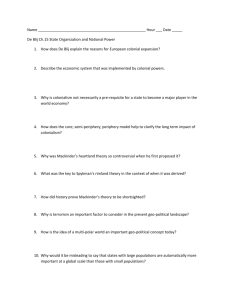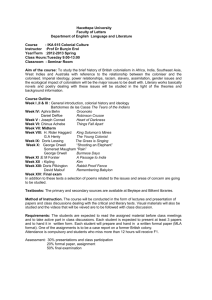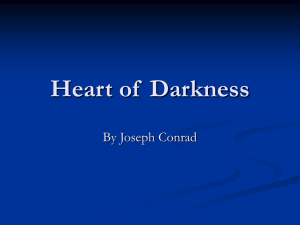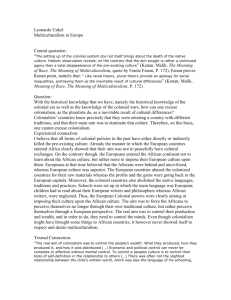CULTURE AND COLONIALISM ANTHROPOLOGY 367-010 SPRING 2012
advertisement
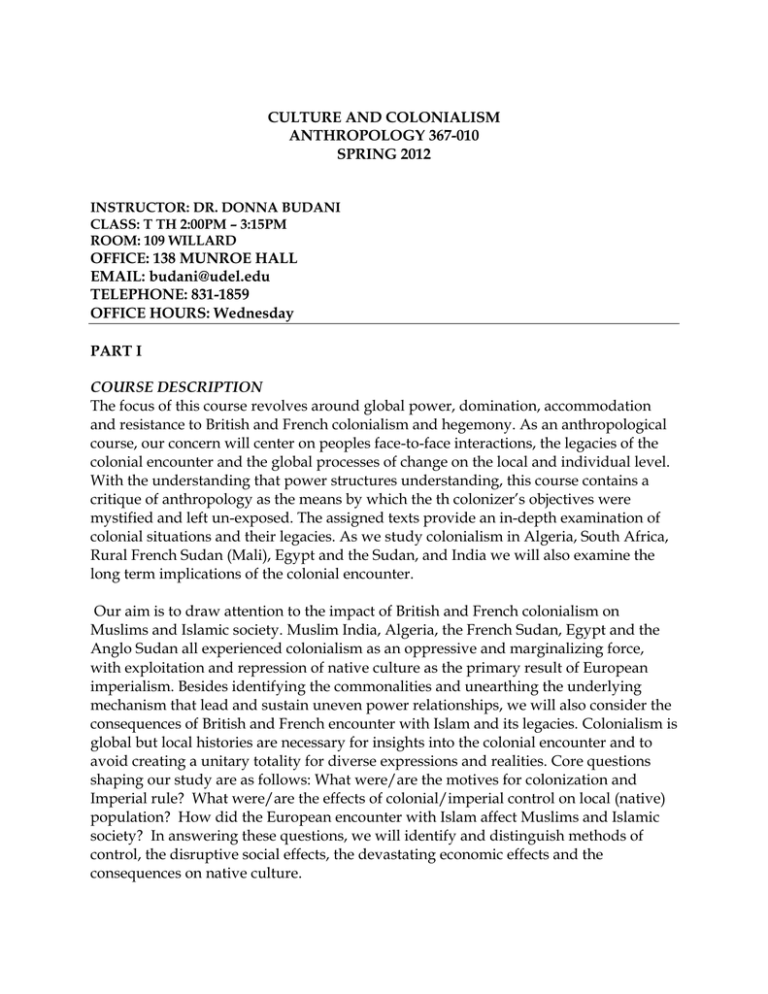
CULTURE AND COLONIALISM ANTHROPOLOGY 367-010 SPRING 2012 INSTRUCTOR: DR. DONNA BUDANI CLASS: T TH 2:00PM – 3:15PM ROOM: 109 WILLARD OFFICE: 138 MUNROE HALL EMAIL: budani@udel.edu TELEPHONE: 831-1859 OFFICE HOURS: Wednesday PART I COURSE DESCRIPTION The focus of this course revolves around global power, domination, accommodation and resistance to British and French colonialism and hegemony. As an anthropological course, our concern will center on peoples face-to-face interactions, the legacies of the colonial encounter and the global processes of change on the local and individual level. With the understanding that power structures understanding, this course contains a critique of anthropology as the means by which the th colonizer’s objectives were mystified and left un-exposed. The assigned texts provide an in-depth examination of colonial situations and their legacies. As we study colonialism in Algeria, South Africa, Rural French Sudan (Mali), Egypt and the Sudan, and India we will also examine the long term implications of the colonial encounter. Our aim is to draw attention to the impact of British and French colonialism on Muslims and Islamic society. Muslim India, Algeria, the French Sudan, Egypt and the Anglo Sudan all experienced colonialism as an oppressive and marginalizing force, with exploitation and repression of native culture as the primary result of European imperialism. Besides identifying the commonalities and unearthing the underlying mechanism that lead and sustain uneven power relationships, we will also consider the consequences of British and French encounter with Islam and its legacies. Colonialism is global but local histories are necessary for insights into the colonial encounter and to avoid creating a unitary totality for diverse expressions and realities. Core questions shaping our study are as follows: What were/are the motives for colonization and Imperial rule? What were/are the effects of colonial/imperial control on local (native) population? How did the European encounter with Islam affect Muslims and Islamic society? In answering these questions, we will identify and distinguish methods of control, the disruptive social effects, the devastating economic effects and the consequences on native culture. LEARNING OBJECTIVES 1. Students taking this course will have a knowledgeable foundation of colonialism, from the perspective of the colonized and colonizer 2. Students taking this course will be knowledgeable about the effects of British, and French colonial rule upon the colonized 3. Students taking this course will learn about the effects of colonial rule on native indigenous cultures. 4. Students taking this course will learn about the particular effects of colonialism in Islamic societies and cultures. 5. Students taking this course will be knowledgeable about colonialism as a means of culture change REQUIRED BOOKS 1. The Colonizer and the Colonized. Albert Memmi, author 2. A Dying Colonialism. Franz Fanon, author 3. Making Empire: Colonial Encounter and the Creation of Imperial Rule in Nineteenth Century, Africa. Richard Price, author 4. Islamization From Below: The Making of Muslim Communities in Rural French Sudan, 1880 – 1960. Brian Peterson, author 5. The Muslims of British India. P. Hardy, author 6. Living With Colonialism: Nationalism and Culture in the Anglo-Egyptian Sudan. Heather J. Sharkey, author ABOUT THE BOOKS Books in this course are expensive. I did my best to find books that were less expensive as well as books of notable scholarship. Unfortunately, I was unable to find books less expensive and equal in scholarship. Please understand that although expensive, the selected books are essential to the success of this course. If the cost of the books is a burden, please tell me. ABOUT THE READINGS At first glance it might appear that the required reading is excessive. A more studied review will reveal that the readings assigned are a selection of different types of readings. The Colonizer and the Colonized, written by Memmi, who is Algerian and thus writing from experience, is an account of the dynamics of the relationships between the colonized and colonizer. Moreover, it is a study of the colonizer’s attempts to control the colonized consciousness and of the mechanisms used by the colonizer to subvert and depreciate native culture and society. Fanon’s Dying Colonialism is the classic study of French attempts to impose their control and rule over Algerians seeking to undermine Islamic society and culture. Richard Price studies the imposition of colonial rule first through missionary rule and second the dis-empowerment of native Xhosa Chiefs and political culture. Peterson’s study presents a different perspective of the Islamization of French Colonial Africa by focusing on the peaceful actions of individuals rather than through the imposition of violence. Hardy’s study introduces the Muslims of India in a historical framework which emphasizes their separate position from Hindus. Finally, Sharkey’s work raises many questions most especially about the day to day lives of people—the colonized— their accommodation to the colonizer and their efforts to rid themselves of colonial rule. PART II COURSE REQUIREMENTS READING 100 Points Keeping current with assigned reading is a major requirement of this course. The books I have selected are reader friendly and interesting. There may be contextual information you may need in order to fully understand the readings; this will be provided in lecture. I encourage you to do some Internet research before you start to read any book and to continue with Internet research as you read. I urge you to read with a purpose and to ask yourselves questions before you begin to read. Questions as simple as “What do I know about the author?” and “What do I know about colonialism?” are questions you should ask yourself immediately and do research on the Internet to construct a context for yourself. Other questions such as “What am I suppose to get out of this reading assignment?” should be asked before and after you do the reading assignment. SEMINAR FORMAT 100 Points This course will function like a seminar. This means that you are expected to come to class not only having done the reading but prepared to discuss issues raised by the material you have read. The quality of this course depends on you. This course will be very interactive—you must come to class prepared to talk about what you have read. In order to be prepared for class conversation, makes notes on the following: What is/are the issue(s) discussed by the author? What is/are the main point(s) of the selection? What is the thesis—what is the author arguing? What are secondary points? What kind of evidence is the author using to make his/her points? What are some of the questions I have prompted by the reading? What do I need explained? These questions are important to consider as you read. Make notes and come to class prepared to answer these questions if called upon. PARTICIPATION 100 Points Classroom participation will be judged on the thoroughness of preparation, evidence that you have read the assignment, the accuracy and insightfulness you display in your remarks, respect for other people’s ideas and speaking time, and demonstration of a grasp of ideas and concepts. While the frequency of contribution to the discussion is important, the quality of your contribution is even more important. ATTENDANCE 100 points Participation requires attendance. Meaningful participation is evidenced by sustained contribution to class discussion and sustained engagement with and understanding of course reading. Because of the heavy emphasis on student participation and interaction, anyone with more than 2 unexcused absences will not receive a grade higher than C-. Attendance will be taken at each class session thus establishing a record of student attendance. An excused absence requires that a student contact me via email by 12pm on the class day and give a detailed reason for missing class. If illness is the reason for missing class, the student must provide a Doctor’s note and/or a copy of a prescription in order to qualify for an excused absence. If the reason for absence is situational, I will determine if the student qualifies for an excused absence. Absences for religious observance are excused absences. Students whose absences are required by the university and / or other classes must provide written proof of required absence. In any case, if for whatever reason you will miss class, you must ntify me via email before 2:00pm of the day of the anticipated absence. Failure to do so will result in a forfeit of 6 points from your final grade. Students must receive my written permission (via email) approving their absence. Students should not assume that permission for absences will be automatically granted. Class starts promptly at 2:00 pm. Students are expected to be on time for class. Frequent lateness will result in a forfeit of 7 points from your final grade for each instance of lateness. CLASS TALKING POINTS AND DISCUSSION QUESTIONS 200 points This class will be a cooperative learning environment in which each student will be responsible for promoting her/his peers learning as well as his/her own. I expect that each student will come to class prepared with written talking points and written discussion questions to stimulate a class conversation. Talking points and discussion questions will be collected periodically. Be prepared to turn in your written talking points and discussion questions for prior classes when called upon to do so. Failure to do so will result in a forfeit of 10 points per occasion of incomplete preparation from your final grade. Talking points and Discussion questions must be typed. Make sure your name is placed in the left corner of the page. I recommend that you take reading notes ( annotate your text or jot down your notes on a pad )about facts, about something that strikes you as interesting, strange or something you want to know more about. Note your reactions to what you read and raise questions about what you read. Look over your notes and compose at least two questions and several talking points about the reading. *PLEASE NOTE* *It is not possible to earn an ‘A’ or an ‘A-‘in this course, regardless of how high your other grades are, unless you actively participate in discussion. Part of your participation grade is based on how prepared you are for class by reading the assignment and the quality of your prepared talking points and discussion questions. However, whether or not you earn either an ‘A’ or ‘A-‘depends on your active participation in class discussion regardless of your scores on other measurable requirements. If this requirement is difficult for you to meet, then I suggest that this class is not for you. FOUR CRITICAL ANALYSIS PAPERS 400 POINTS The act of writing about something helps us to develop coherent and organized understanding of our reading. Because of this, we will be writing 4 critical analysis papers at key points throughout the semester. These papers will analyze an assign text within the broader context of our course. Paper should be 6 to 8 pages in length, 1.5 line spacing, and typed, using a 10 or 12 point font, Times or Times New Roman font. Write an engaging title for your paper. Papers should follow MLA guidelines and should adhere to academic citation standards. Papers will be graded on the basis of the strength of their arguments, the clarity of their writing and the originality of the thinking they display. All papers must have a thesis statement at the end of the introduction and topic sentences at the beginning of each paragraph. Be sure to use transition paragraphs where required. A fifth paper may be written if a student is not satisfied with his or her grade on a particular paper. In this case, the lowest grade will be dropped in lieu of the expected higher grade of the fifth paper. See your syllabus for due dates for the required papers. WHAT IS A CRITICAL ANALYSIS PAPER? A critical analysis paper asks the writer to make an argument about a particular book, essay, movie etc. The goal is twofold: first, identify and explain the argument(s) the author is making and two, provide your own argument about the author’s argument. You are not writing a book report or a book review but a CRITICAL ANALYSIS evaluating the author’s argument. In any of the assigned texts, authors provide several major and minor arguments. In a critical analysis paper, you are asked to identify the author’s major argument or the answer to the question “what is the author’s main point?” Having identified the author’s main point, you are asked to give the author’s main arguments considerable thought and to identify the author’s claims in support of his/her main argument. What assumptions does the author make in his/her argument? Are these assumptions valid? What evidence does the author use to support his/her argument? How do you evaluate the evidence and do you accept the evidence? What about subthemes? What are the subthemes and do they support claims made by the author. You can critically assess an argument on its theoretical basis, its thesis, the use of evidence, minor arguments and conclusions reached by the author. Obviously, conclusions reached must follow from the author’s claims. A good way to start a critical analysis is to allow yourself 15 or 20 minutes of free writing in which you list the claims made by author throughout the book. Ask yourself questions about aspects of the text that are not clear to you, confuse you and/or do not completely understand. What about the silences in the book—what does the author choose not to talk about? What are the explicit messages about colonialism and what are the more implicit messages about colonialism? What questions about colonialism can this book help you answer? What are the limitations of the book? Then review what you wrote and compose what you think are some of the author’s main points and arguments. Refine your selection and select what you think best states the major point the author makes in the book. This should constitute your critique of the author’s argument. In your introduction paragraph, begin with a sentence or two that grabs your reader’s attention. This is followed by an assertion you as the reader make or you ask a particularly critical question about what you have read. Then, write your thesis in which you state your assessment of the author’s major argument. The body of your paper is first directed to your explanation of the author’s major argument including any assumptions the author makes. Next, present your own assessment or critique of the author’s major argument. Your conclusion is followed by one to two paragraphs in which you reflect on the text and mention its contribution to your understanding of colonialism in general and about the particular subject of the text. IMPERIALIST ARTICLES FROM THE JOURNAL OF ROYAL AFRICAN SOCIET 100 POINTS See course schedule for reading assignment on articles from the Journal of Royal African Society. The articles were written in the beginning of the 20th century at the height of European Imperialism in Africa. The supposed “scholars”, who wrote these articles, assumed colonial conquest as a given right; its mission was to bring civilization to Africa where they assumed the absence of society and culture. The readings give you some insights about how Imperialist Europeans thought and how they understood what they experienced as they came into contact with Africans. Select any five articles (each article is very short, less than 3 pages on a half size page) and write a 5 page essay in which you discuss your impressions of the articles, especially about the way they write about Africans and make special note of the the authors ideas and perspectives of Africa, African society and the native peoples of Africa. Treat your five articles as a whole but when referring to something in a particular article, cite the article by title and journal information. Think about the following questions as prompts to your critical analysis of the articles: What are some of the assumptions held by the author about Africans and African society? What ideas, beliefs and norms seem to be taken for granted but would not be acceptable today? What are the images of Africa and Africans presented in the articles? What impressions of colonialism. the colonizer and the colonized do you obtain from the articles you have selected? Do you find evidence of racism and ethnocentrism? Explain. What is missing from the articles that would appear in a contemporary scholarly article? What is present in the articles that would be strongly objected to in the present day? Write a conclusion with reflective comments about the articles. Be sure to identify the articles you select by title and author in your essay. YOUTUBE VIDEO ASSIGNMENTS 50 points per assignment YOUTUBE Videos are assignment to present you with a visual context to supplement your reading. Lectures will also provide a context to compliment your assigned reading. For specific videos, written assignments are required. These assignments are valued at 50 points each and are submitted to Sakai. Assignments for Sakai are time and date specific. Under no circumstance will a Sakai site be re-open to accommodate late submissions. PART III POLICIES FINAL GRADES See statement about Participation and Final grades above. Your final grade is a measure of the quality of work you provide when completing course requirements. Final grades are calculated based on the total number of points available in the course and the number of points you earn as an average of the total available points. PLEASE NOTE: I do not negotiate final grades. I do not discuss final grades what so ever, or on the phone or via email or in person. Your final grade will reflect the scores you earned and your measurable effort during the course. This is a rigorous and demanding course. I expect efforts characteristic of students attending classes at a university. I expect that you will work hard and will have to manage a very heavy reading work load. If you have any doubt as to whether or not you can manage the work load, then I advise you to drop the course. If you think your final grade in error, then you must prepare three single spaced paragraphs in the form of a petition in which you provide information about what you think is an error. Please note: the effort you put forth in this class is expected and not subject to special consideration in calculating your final grade. LATE PAPERS, DISCUSSION QUESTIONS AND TALKING POINTS I do not accept late papers, daily discussion questions and talking points unless the student has provided me with a very good responsible reason. Critical Analysis papers will not be accepted late unless I am provided with a very good reason one week before the paper is due. Heavy workloads in other classes, exams or multiple exams in other classes or problems with writing are not good reasons for an exception. Also, printers that break and/or computers that do not work are not good reasons for an extension of due date; Also, not having the required book is not an acceptable reason to extend a due date. If a student has been sick, he or she is obliged to show me a Doctor’s Note or copy of a prescription. If this is the case, I may extend the due date for three days. Students must have my written permission to extend a due date. Do not assume that deadlines can be easily extended. The penalty for an unexcused late paper is a full 10 points drop in grade for the paper. If you join the class late, you are expected to become current as soon as possible. No due date will be extended because you joined the class late. COURSE RULES OF ETIQUETTE The University is a place for adults. I expect that you will BEHAVE like responsible, trustworthy, and reliable adults with character and integrity. All cell phones, pagers, PDA’s and other electronic devices must be turned off. Ordinarily, I have a no laptop policy as the temptation to do work for other classes, email, search the social network etc, is too great. However, I also recognize the utility of taking class notes on a laptop or other computer devices. Be aware that sitting in class using your computer for any other reason than taking class notes WILL RESULT IN A LOSS OF 10 POINTS FROM YOUR FINAL GRADE. Once you enter the classroom and take your seat I consider you committed to staying for the full class. If you do not intend to stay for the entire class or the entire film, please do not come to class.If you intend to leave class before the end of lecture, you must inform me before class, sit in the back close to the door and leave class as quietly as possible. Be sure not to slam the door. MUTUAL RESPECT Once class begins we become a community that has rules. The purpose of our gathering is to focus on the topic and readings assigned for the day. Mutual respect is demonstrated by me when I am prepared to teach the day’s lesson. Mutual respect is demonstrated by you when you come to class prepared to participate in discussion about the day’s reading assignment. Class is not the time or place for socializing. We each have expectations of the other. You expect me to be prepared and to be a good teacher. You expect to learn something about colonialism. I expect you come to class prepared, having done your reading, and ready to participate in class. SPECIAL CIRCUMSTANCES I assume that many of you work more than 20 hours a week, travel to school in cars that break down or you have a demanding major or you have academic special circumstances or you have obligations to your family or you may have children of your own. Please make me aware of any special circumstance that has the potential to or will impact on your performance in this course. I will do all I can to work with you so that you chances of getting a good grade is supported OFFICE HOURS I refer you to the first page of this document where you will find the location of my office and my office hours. I invite you to take advantage of my office hours. I encourage all students to regularly consult with me concerning lecture material, i.e. unclear or confusing notes, readings, any other matter affecting your performance in this class. Or, just come in for a friendly chat. If you prefer, consultation may be conducted via email. I promise a quick response to all emails. COURSE GRADE An ‘A’ applies to outstanding work which features not simply command of the material and excellent presentation (spelling, grammar, organization and writing style etc.) but, most importantly, sustained intellectual engagement with the material. The engagement takes such forms as shedding original light on the material, investigating patterns and connections, posing questions and raising issues. An ‘A’ indicates achievement of distinction. It involves conspicuous excellence in several aspects of your work. For instance, work that is compelling enough to engage the reader on its own terms, is fresh and distinctive, sophisticated and grammatically accurate deserves an ‘A’ A ‘B’ is given to work of high quality that reflects a command of the material and a strong presentation but lacks sustained intellectual engagement with the material. A ‘B’ paper lacks the rigor and distinctive approach of an ‘A’ paper but is none the less an intelligent and competent piece of work. ‘C’ work receives a ‘C’ if it is of good over-all quality but exhibits a lack of intellectual engagement as well as either deficiencies in your command of the material or problems with presentation. It involves such work as may be fairly expected of any UDEL student. A ‘C’ paper is adequate but offers nothing insightful or compelling. In part this might be due to the lack of a thesis statement, poor grammar, or lack of clear transition sentences. The grade of ‘D’ indicates significant problems with your work such as shallow understanding of the material or poor writing. It indicates passing work but below standards work. An ‘F’ is given when you fail to demonstrate an adequate understanding of the material, fail to address the exact topic of a question or assignment or fail to follow the directions in an assignment. Distribution of Grades A = 94% A-= 90% B+ = 87% B = 85% B- = 80% C + = 77% C=75% C- = 70% D+ = 67% D = 65% D- = 60% F = 59% or below COURSE SCHEDULE CULTURE AND COLONIALISM ANTH367-010 SPRING 2012 Please note: This schedule of readings, class assignment and performance requirements is subject to change. Changes are made when, for pedagogical reasons, changes to schedule seem prudent. Changes will be announced in class and in an email to the class. My advice to you is to be as flexible as possible. If changes are made to the schedule of classes and/or to class exercises, changes will be made within a time frame that is least disruptive to students in the class. TUESDAY, FEBRUARY 7 Course Overview Assignment: YOUTUBE: Search and View Video Title: Colonialism: Sins of Europe in the Scramble for Africa; Search Video Title: Imperialism in Europe during the 19th century; Search Video Title: The Colonization of the Congo Pt 1; Colonization of the Congo Pt 2 Search Video Title: British Imperialism; Search Video Title: Africa Imperialism. THURSDAY, FEBRUARY 9 Reading Assignment: 1.In Memmi, Colonized and The Colonizer Read Introduction and Part 1: Portrait of Colonizer, page 3 – 18 2. Follow Instructions on Essay on Readings in The Journal of the Royal African Society in Syllabus. Access Journal Articles On UDEL Home Page click Libraries & Select Database; then select “J” for JSTOR; Insert JSTOR in Database; At JSTOR select Browse Disciplines Select African Studies; Select Journal of the Royal African Society. Select & Read Vol. 3, No 11, April, 104 The Conditions of Negro Labor in the South African Mines pp.231-237 H.H. Johnson, author Select & Read Vol. 5, No. 18, January 1906 The Problem of Agricultural Development in West Africa pp.117-129 Emile Baillaud Select & Read Vol. 5, No 20, July 1906 The Aborigines of South Africa pp.381-388 A, Worner, author The Regeneration of Africa pp404-408 P. Ka Lsaka Seme, author Select Vol. 6, No. 23, April, 1907 Sierra Leone and the Natives of West Africa pp. 250258. Leslie Probyn, author Submit Essay on Readings to Sakai No Later Than Sunday, February 12th by 11:30 pm. 3. YOUTUBE: Search Video Title: British Imperialism South Africa Tuesday, February 14 Reading Assignment: 1. In Memmi, Colonized and The Colonizer Read Introduction and Part 1: Portrait of Colonizer, page 18 - 75 2. YOUTUBE: Search Video Title: European imperialism video; Search Video Title: Belgium Imperialism in the Congo Worst Case of Imperialism; Search Video Title; The broken heart of Africa – The Cong; Search Video Title: French Colonialists vs Algerian Muslims; Search Video Title: Documentary Iraq a history of colonialism -1 of 5;View all 5 videos. Write three single spaced paragraphs in which you discuss your reactions to the video. Has the video contributed to your understanding of colonialism? How so? Submit to Sakai by Saturday, February 18th by 11:30pm. Thursday, February 16 In Memmi, Colonizer and The Colonized Read Part II Portrait of the Colonized, page 79 141 Film: White King, red rubber, black death DVD 4046. Write three single spaced paragraphs in which you discuss your reactions to the film. Submit to Sakai by Sunday, February 19th by 11:30pm Tuesday, February 21 Reading Assignment In Fanon, Dying Colonialism Read Preface, & Algeria Unveiled, pages 35 – 67 1. YOUTUBE: Search Title Video: Veterans: The French in Algeria; Search Video Title: Dutch Colonial Empire 1600 – 1975; Search Video Title: Colonial Dutch-Indies (1938 -39 in colour) Part 1; Watch Videos Part 1 -4. Please note that the language used in the videos is Dutch. Nevertheless, the videos focus on the colonizer and their imposition of Dutch culture, life style and attitudes. Watch for the representation of the natives or today Indonesians. How do they figure in the videos? Are you even aware that the videos are set in South East Asia? What strikes you as strange or confusing about the videos? Write three single spaced paragraphs about your responses to the aforementioned questions. Submit to Sakai by Saturday, February 25th by 11:30pm. Thursday, February 23 Reading Assignments In Fanon, Dying Colonialism Read This is the Voice of Algeria, pages 69 - 97 Tuesday, February 28 Reading Assignment In Fanon, Dying Colonialism Read Medicine and Colonialism, pages 121 – 145 & Algeria’s European Minority, pages 147 - 178 Thursday, March 1 Reading Assignment In Price, Making Empire Read Chapters 1. Encounters in Empire & Chapter 2. Making of Missionary Culture. Critical Analysis Paper Dying Colonialism Submit to Sakai No Later Than Sunday 11:30pm Tuesday, March 6 Reading Assignment In Price, Making Empire Read Chapters 3. Observation, Engagement and Optimism; & Chapter 4. Cultural Encounter: The Destabilization of Missionary Culture. Access: http://wsl.ad.economics.harvard.edu/faculty/nuu/files/Religious_Conversion_AERP P.pdf Read article. Write a three page double space critique of the article. Submit to Sakai by Saturday, March 10th by 11:30pm. Thursday, March 8 Reading Assignment In Price, Making Empire Read Chapter 5. Missionary Encounter: The Chiefs 1. YOUTUBE: Search Video Title: Christianity and Imperialism: The British Empire – Professor Richard J. Evans; Search Video Title: The Victorian view of Non-Europeans – Professor Richard J. Evans Tuesday, March 13 Reading Assignment In Price, Making Empire Read Chapter 6. The Closing Of The Missionary Mind. & Chapter 7. Creating Colonial Knowledge Thursday, March 15 Reading Assignment In Price, Making Empire Read Chapters 8.Meetings, Ceremonies and Display. & Chapter 9. Empire As Democracy. Tuesday, March 20 Reading Assignments In Price, Making Empire Read Chapters 11. The Destruction of the Xhosa Chiefs, Chapter 12. The Trial of the Chiefs. & Chapter 13. Postscript: Endings and Beginnings.. Thursday, March 22 Reading Assignment In Sharkey, Living With Colonialism, Chapters 1. Living With Colonialism. & Chapter 2. Being “Black” Being “Sudanese”: Colonial Education, Privileges, and National Identity SPRING BREAK Tuesday, April 3 In Sharkey, Living With Colonialism, Chapters 3. Education, Acculturation and Nationalist Networks & Chapter 4.The Mechanics of Colonial Rule 1. YOUTUBE: Search Video Title: Edward Said discusses his 1978 book; [Said’s 1978 book entitled Orientalism]; Search Video Title: Orientalism as a Tool of Colonialism 1/4; View all 4 videos. Submit to Sakai three single spaced paragraphs in which you discuss three important points raised in the videos. Submit to Sakai by Saturday, April 7th by 11:30pm. Thursday, April 5 Reading Assignment In Sharkey, Living With Colonialism, Chapter 5. The Nation After The Colony. & Chapter 6. The Colony and The Nation: Lessons from the Sudan Critical Analysis Paper Making Empire Submit to Sakai No Later Than Sunday 11:30pm Tuesday, April 10 Reading Assignment In Hardy, The Muslims of British India, In Hardy, The Muslims of British India, Chapters 1. Introduction: The Medieval Legacy 1. YOUTUBE: Search Video Title: Islamic India – 18th century and the Start of the British Occupation; Search Video Title: The British Raj and the Revolt of 1857 .flv Thursday, April 12 Reading Assignment In Hardy, The Muslims of British India, Chapters 2. The Effects of British Rule on Muslims Before 1857. & Chapter 3. 1857 and Its Aftermath 1. YOUTUBE: Search Video Title: Edward Said UCLA Lecture 1; Watch all 10 parts. Write three single spaced paragraphs on Orientalism and the points raised by Dr. Said during the lecture. What specifically does Dr. Said discuss that intrigues you the most? Submit to Sakai by Sunday, April 15th by 11:30pm. Tuesday, April 17 Reading Assignment In Hardy, The Muslims of British India, Chapter 4. The Muslims Come To Terms With British India As Muslims. & Chapter 5. Muslims Move Toward Political Community 1871 - 1901 1. YOUTUBE: Search Video Title: Imperialism in India; Search Video Title: Imperialism: The British in India; Search Video Title: Edward Said: The Myth of the Clash of Civilization; [Watch all parts of the Video] Write three single spaced paragraphs in which you summarize Said’s argument about the “Myth” of the Clash of Civilization. Why does Said call it a Myth? Submit to Sakai by Saturday, April 21st by 11:30pm. Thursday, April 19 Reading Assignments In Hardy, The Muslims of British India. Chapters 6. Muslims Acquire A Constitutional Identity and Enter All India Politics. & Chapter 7. Religion Enters Politics: 1910-1924 Critical Analysis Paper Living With Colonialism Submit to Sakai No Later than 11:30pm Sunday, April 22nd Tuesday, April 24 Reading Assignment In Hardy, The Muslims of British India Chapter 9. The Two Partitions of British India and of The Muslim Community 1.YOUTUBE: Search Video Title: Edward Said: Orientalism April 16, 2003; Search Video Title: Edward Said: Two films; Search Video Title: Edward Said: The Last Interview Part 1; View all Parts. Write three single spaced paragraphs in which you summarize the key points of the interview. Submit to Sakai by Saturday, April 28th by 11:30pm Thursday, April 26 Lecture: French Colonialism in South West Africa Tuesday, May 1 Reading Assignment In Peterson, Islamization From Below, Chapter 1. The Wars of Samori. & Chapter 2. Reconstructing a Fragmented World Thursday, May 3 Reading Assignment In Peterson. Islamization From Below, Chapter 3. Slave Emancipation and The Expansion of Islam, 1905 – 1914. Critical Analysis Paper, The Muslims of British India Submit to Sakai No Later Than 11:30 pm Sunday Tuesday, May 8 Reading Assignment In Peterson, Islamization From Below, Chapter 4. Coping With Colonialism Thursday, May 10 Reading Assignment In Peterson, Islamization From Below, Chapter 5. Migrants and the Dialectics of Conversion Tuesday, May 15 Reading Assignment In Peterson, Islamization From Below, Chapter 6. Changes in the Religious Landscape Critical Analysis Paper Islamization From Below Submit to Sakai No Later than 11:30pm Sunday, May 19th by 11:30pm.

